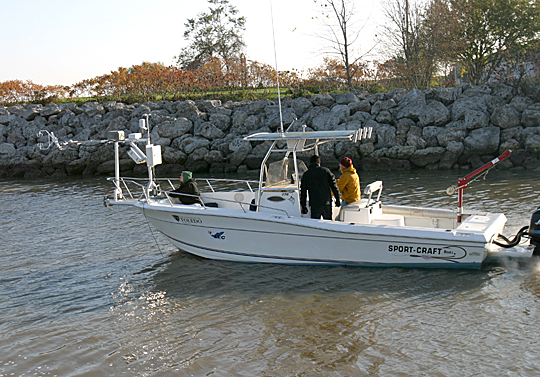University of Toledo researchers will be out on Lake Erie this spring investigating the very thing that likely contributed to 2012’s abnormally warm winter — carbon dioxide.

A suite of sensors mounted on the bow of the Mayflier II is part of a network to measure the exchange of carbon between the atmosphere and Lake Erie.
“For the last two decades, we’ve been trying to measure the exchange of carbon dioxide between the atmosphere and earth surfaces,” said Dr. Jiquan Chen, professor of environmental sciences and the lead researcher on the sensor network. “We want to determine which areas serve as carbon sinks or sources of carbon as we investigate ways to sequester the molecule to slow down global warming.”
The center purchased and installed two permanent monitoring stations and one boat-mounted mobile sensor to measure the exchange of carbon dioxide and water between the lake surface and the atmosphere.
“Measuring the ecological patterns of Lake Erie will help us better understand things like algal blooms and the role industrial activity and agricultural runoff play in affecting one of this region’s greatest natural resources,” Chen said.
Dr. Carol Stepien, director of the Lake Erie Center, said this is the first time this sort of carbon exchange will be measured on a large inland lake and pointed to some of the tangible benefits that more knowledge about the carbon dioxide interaction cycle could have.
“There was a hole in the available research and given the Lake Erie Center’s leadership role in this area, we’ll soon have data that we hope will help investigations into monitoring ever-increasing algal blooms to improve our water quality and the ecology of the Great Lakes, including fishery resources. This research impacts everyone in the region and will provide important insights into the global carbon cycle,” Stepien said.
Joining Chen and Stepien in the project are Dr. Richard Becker and Dr. Tom Bridgeman, assistant and associate professors of environmental sciences, respectively; Dr. Kevin Czajkowski, professor of geography and planning; and Michael Deal, a research technician in environmental sciences.